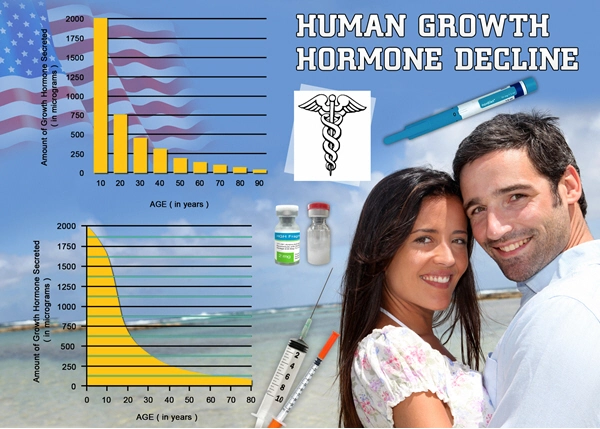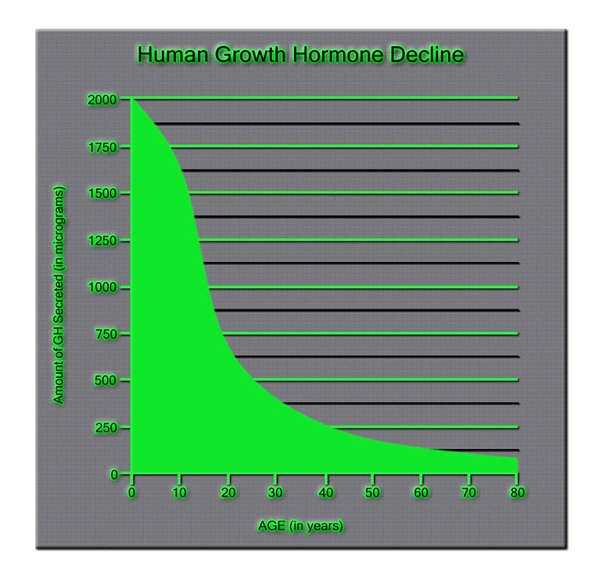Introduction
Sarcopenia, the age-related loss of muscle mass and strength, poses a significant health challenge for American males, affecting their quality of life and increasing the risk of various comorbidities. As the population ages, the prevalence of sarcopenia is expected to rise, making the search for effective interventions more urgent. Human Growth Hormone (HGH) has emerged as a potential therapeutic agent in this context. This article reviews the current research on HGH's role in preventing age-related muscle loss in American males and discusses future directions for research and clinical application.
Understanding Sarcopenia and Its Impact on American Males
Sarcopenia is not merely a cosmetic concern but a serious medical condition that can lead to frailty, falls, and a reduced ability to perform daily activities. For American males, who often value physical strength and independence, the onset of sarcopenia can be particularly distressing. The condition is characterized by a decline in muscle mass, strength, and function, primarily due to the natural aging process. However, lifestyle factors such as physical inactivity and poor nutrition can exacerbate the condition.
The Biological Role of Human Growth Hormone
Human Growth Hormone, produced by the pituitary gland, plays a crucial role in growth, cell reproduction, and regeneration. Its levels naturally decline with age, which coincides with the onset of sarcopenia. HGH stimulates the liver to produce insulin-like growth factor-1 (IGF-1), which is essential for muscle growth and repair. This biological pathway makes HGH a promising candidate for interventions aimed at preventing or mitigating muscle loss in aging males.
Current Research on HGH and Muscle Preservation
Recent studies have explored the potential of HGH supplementation to counteract sarcopenia. A systematic review published in the *Journal of Clinical Endocrinology & Metabolism* found that HGH administration can increase muscle mass in older adults. However, the effects on muscle strength and function are less consistent, suggesting that HGH alone may not be sufficient to fully address sarcopenia.
Another study in the *American Journal of Physiology-Endocrinology and Metabolism* highlighted the synergistic effects of HGH and resistance training. The combination was found to be more effective than HGH alone in improving muscle mass and strength in older males. These findings underscore the importance of integrating HGH therapy with lifestyle interventions for optimal results.
Challenges and Considerations in HGH Therapy
Despite its potential benefits, HGH therapy is not without challenges. Side effects such as joint pain, fluid retention, and an increased risk of diabetes are concerns that must be carefully managed. Additionally, the high cost of HGH treatment and the need for long-term administration pose practical barriers to its widespread use.
Moreover, the ethical implications of using HGH for anti-aging purposes cannot be overlooked. The potential for abuse and the societal pressure to maintain a youthful appearance may lead to inappropriate use of the hormone. Therefore, it is crucial to establish clear guidelines and monitor the use of HGH in clinical settings.
Future Directions in Research and Clinical Application
Looking ahead, research should focus on optimizing HGH therapy protocols to maximize benefits while minimizing side effects. This could involve exploring different dosing regimens, combining HGH with other anabolic agents, or developing targeted delivery systems to enhance its efficacy.
Furthermore, large-scale clinical trials are needed to better understand the long-term effects of HGH on muscle health and overall well-being in American males. These studies should also investigate the role of HGH in preventing other age-related conditions, such as osteoporosis and cardiovascular disease, to provide a more comprehensive view of its therapeutic potential.
Conclusion
Human Growth Hormone holds promise as a tool in the fight against sarcopenia in American males. While current research indicates that HGH can increase muscle mass, its impact on strength and function requires further exploration. Integrating HGH therapy with resistance training and addressing the associated challenges and ethical considerations will be crucial for its successful application. As research progresses, HGH may become a valuable component of a multifaceted approach to maintaining muscle health and vitality in aging American males.

- Decoding the Enigma: The Wonders and Science of Human Growth Hormone [Last Updated On: February 25th, 2025] [Originally Added On: February 25th, 2025]
- Unfolding the Human Growth Journey: The Essential Role of HGH [Last Updated On: February 26th, 2025] [Originally Added On: February 26th, 2025]
- Unlocking the Secret to Longevity: Exploring the Anti-Aging Effects of Human Growth Hormones [Last Updated On: February 27th, 2025] [Originally Added On: February 27th, 2025]
- The Silent Architect: Human Growth Hormone and its Role in Bodily Development [Last Updated On: February 28th, 2025] [Originally Added On: February 28th, 2025]
- Decoding HGH: An In-Depth Look at Growth Hormones for Beginners [Last Updated On: February 28th, 2025] [Originally Added On: February 28th, 2025]
- Decoding the Enigma: Unfolding the Intricate Mechanisms of Human Growth Hormone [Last Updated On: March 1st, 2025] [Originally Added On: March 1st, 2025]
- The Interplay of Hormones: Exploring the Interaction of Human Growth Hormone [Last Updated On: March 2nd, 2025] [Originally Added On: March 2nd, 2025]
- Exploring the Multifaceted Role of Human Growth Hormone: Impacts on Cardiovascular, Liver, Brain Health, and Beyond [Last Updated On: March 3rd, 2025] [Originally Added On: March 3rd, 2025]
- Exploring Growth Hormone Therapy: Applications and Ethical Considerations [Last Updated On: March 4th, 2025] [Originally Added On: March 4th, 2025]
- Exploring Human Growth Hormone: Natural and Synthetic HGH Analysis [Last Updated On: March 5th, 2025] [Originally Added On: March 5th, 2025]
- Exploring HGH's Role in Muscle Repair and Recovery for American Males [Last Updated On: March 6th, 2025] [Originally Added On: March 6th, 2025]
- Unlocking the Power of Exercise: How Workouts Boost Human Growth Hormone in American Males [Last Updated On: March 6th, 2025] [Originally Added On: March 6th, 2025]
- Unlocking the Potential of HGH for Muscle Growth and Athletic Performance in American Men [Last Updated On: March 7th, 2025] [Originally Added On: March 7th, 2025]
- Comprehensive Guide to HGH Deficiency in American Men: Causes, Symptoms, Diagnosis, and Treatment [Last Updated On: March 8th, 2025] [Originally Added On: March 8th, 2025]
- HGH: Influencing Metabolism, Muscle Growth, and Energy Levels in American Males [Last Updated On: March 9th, 2025] [Originally Added On: March 9th, 2025]
- Unleashing Potential: Dietary Strategies to Naturally Enhance Human Growth Hormone in American Males [Last Updated On: March 10th, 2025] [Originally Added On: March 10th, 2025]
- Maximizing Athletic Performance: The Role of Human Growth Hormone in American Male Athletes [Last Updated On: March 14th, 2025] [Originally Added On: March 12th, 2025]
- Unlocking the Secrets of Youth: The Future of Anti-Aging Medicine with HGH Therapy [Last Updated On: March 13th, 2025] [Originally Added On: March 13th, 2025]
- Unlocking the Power of HGH: Lifestyle Strategies for American Males to Boost Natural Growth Hormone Production [Last Updated On: March 15th, 2025] [Originally Added On: March 15th, 2025]
- Maximizing HGH in American Males: The Crucial Role of Sleep Quality and Duration [Last Updated On: March 16th, 2025] [Originally Added On: March 16th, 2025]
- HGH Decline in Aging American Males: Impacts and Mitigation Strategies [Last Updated On: March 17th, 2025] [Originally Added On: March 17th, 2025]
- Human Growth Hormone in Pediatrics: Role, Diagnosis, and Treatment for American Males [Last Updated On: March 18th, 2025] [Originally Added On: March 18th, 2025]
- HGH's Potential Cardiovascular Benefits for American Males: A Comprehensive Overview [Last Updated On: March 18th, 2025] [Originally Added On: March 18th, 2025]
- Human Growth Hormone: Risks, Regulations, and Ethical Dilemmas in American Males [Last Updated On: March 18th, 2025] [Originally Added On: March 18th, 2025]
- Human Growth Hormone: From Discovery to Clinical Applications and Future Prospects [Last Updated On: March 19th, 2025] [Originally Added On: March 19th, 2025]
- HGH in Hormone Replacement Therapy: Benefits, Risks, and Longevity for American Males [Last Updated On: March 19th, 2025] [Originally Added On: March 19th, 2025]
- HGH's Crucial Role in Bone Health for American Males: Growth, Maintenance, and Therapy [Last Updated On: March 19th, 2025] [Originally Added On: March 19th, 2025]
- Cortisol's Impact on HGH in American Males: Strategies for Health Optimization [Last Updated On: March 20th, 2025] [Originally Added On: March 20th, 2025]
- HGH's Cellular Impact: Growth, Repair, and Metabolism in American Males [Last Updated On: March 21st, 2025] [Originally Added On: March 21st, 2025]
- HGH Market Dynamics: Trends, Costs, and Global Business for American Males [Last Updated On: March 21st, 2025] [Originally Added On: March 21st, 2025]
- HGH: Legal, Ethical, and Health Implications in Sports and Medicine [Last Updated On: March 21st, 2025] [Originally Added On: March 21st, 2025]
- Innovative HGH Delivery Systems: Enhancing Therapy for American Males [Last Updated On: March 22nd, 2025] [Originally Added On: March 22nd, 2025]
- HGH's Role in Brain Function and Cognitive Health for American Males [Last Updated On: March 23rd, 2025] [Originally Added On: March 23rd, 2025]
- HGH and IGF-1: Impact on Growth, Metabolism, and Health in American Males [Last Updated On: March 23rd, 2025] [Originally Added On: March 23rd, 2025]
- Ethical Dilemmas of HGH Use in American Male Athletes: Performance vs. Integrity [Last Updated On: March 23rd, 2025] [Originally Added On: March 23rd, 2025]
- HGH's Role in Wound Healing and Recovery for American Males [Last Updated On: March 23rd, 2025] [Originally Added On: March 23rd, 2025]
- Recombinant Human Growth Hormone: Benefits and Ethical Considerations for American Males [Last Updated On: March 23rd, 2025] [Originally Added On: March 23rd, 2025]
- HGH Benefits and Risks for American Males' Post-Workout Recovery [Last Updated On: March 23rd, 2025] [Originally Added On: March 23rd, 2025]
- HGH's Role in Enhancing Immunity for American Males: Benefits and Considerations [Last Updated On: March 23rd, 2025] [Originally Added On: March 23rd, 2025]
- Debunking HGH Myths: Truths About Aging, Performance, and Safety for American Males [Last Updated On: March 23rd, 2025] [Originally Added On: March 23rd, 2025]
- Acromegaly in American Males: Symptoms, Diagnosis, and Treatment Guide [Last Updated On: March 23rd, 2025] [Originally Added On: March 23rd, 2025]
- Environmental Factors Impacting HGH Levels in American Males: Optimization Strategies [Last Updated On: March 24th, 2025] [Originally Added On: March 24th, 2025]
- HGH and Aging: Benefits, Risks, and Holistic Approaches for American Males [Last Updated On: March 24th, 2025] [Originally Added On: March 24th, 2025]
- HGH Therapy: Enhancing Men's Health and Hormonal Harmony [Last Updated On: March 24th, 2025] [Originally Added On: March 24th, 2025]
- HGH's Role in Cellular Regeneration for American Males: Mechanisms and Benefits [Last Updated On: March 24th, 2025] [Originally Added On: March 24th, 2025]
- HGH Therapy: Enhancing Life for American Males with Chronic Illnesses [Last Updated On: March 25th, 2025] [Originally Added On: March 25th, 2025]
- Managing HGH Deficiency in American Males: Treatments and Lifestyle Interventions [Last Updated On: March 25th, 2025] [Originally Added On: March 25th, 2025]
- Human Growth Hormone: Roles, Aging, and Optimization Strategies for American Males [Last Updated On: March 25th, 2025] [Originally Added On: March 25th, 2025]
- Maximizing HGH Levels with High-Intensity Workouts for American Males [Last Updated On: March 25th, 2025] [Originally Added On: March 25th, 2025]
- HGH's Role in Muscle Gain and Fat Loss for American Males [Last Updated On: March 25th, 2025] [Originally Added On: March 25th, 2025]
- HGH Supplements: Efficacy, Risks, and Natural Boosting Methods for American Males [Last Updated On: March 25th, 2025] [Originally Added On: March 25th, 2025]
- HGH Therapy: A Promising Approach to Prevent Osteoporosis in American Males [Last Updated On: March 25th, 2025] [Originally Added On: March 25th, 2025]
- HGH's Role in Cognitive Enhancement: Insights for American Males [Last Updated On: March 26th, 2025] [Originally Added On: March 26th, 2025]
- Optimizing HGH for Growth: Natural Strategies for American Males [Last Updated On: March 26th, 2025] [Originally Added On: March 26th, 2025]
- Obesity's Impact on HGH Levels in American Males: Strategies for Health Improvement [Last Updated On: March 26th, 2025] [Originally Added On: March 26th, 2025]
- HGH Therapy: Synergy with Testosterone, Nutrition, and Exercise for Men's Health Optimization [Last Updated On: March 26th, 2025] [Originally Added On: March 26th, 2025]
- HGH Testing: Essential Guide for American Males' Health and Vitality [Last Updated On: March 26th, 2025] [Originally Added On: March 26th, 2025]
- HGH's Impact on Organ Systems in American Males: Risks and Management [Last Updated On: March 26th, 2025] [Originally Added On: March 26th, 2025]
- Human Growth Hormone: Exploring Its Role in Longevity and Health for American Males [Last Updated On: March 26th, 2025] [Originally Added On: March 26th, 2025]
- HGH's Role in Regenerative Medicine: Enhancing Health and Vitality in American Males [Last Updated On: March 26th, 2025] [Originally Added On: March 26th, 2025]
- HGH Benefits for Skin: Youthful Appearance and Health for American Males [Last Updated On: March 27th, 2025] [Originally Added On: March 27th, 2025]
- HGH in Women's Health: Benefits, Risks, and Therapeutic Uses [Last Updated On: March 27th, 2025] [Originally Added On: March 27th, 2025]
- HGH's Role in Muscle Recovery and Athletic Performance for American Males [Last Updated On: March 27th, 2025] [Originally Added On: March 27th, 2025]
- HGH Therapy Advances for American Males: Enhancing Health and Performance [Last Updated On: March 27th, 2025] [Originally Added On: March 27th, 2025]
- Human Growth Hormone: Daily Impact and Optimization for American Males [Last Updated On: March 27th, 2025] [Originally Added On: March 27th, 2025]
- Intermittent Fasting Boosts HGH: Benefits and Safe Implementation for American Males [Last Updated On: March 27th, 2025] [Originally Added On: March 27th, 2025]
- HGH Boosts Post-Surgical Recovery in American Males: Mechanisms and Benefits [Last Updated On: March 28th, 2025] [Originally Added On: March 28th, 2025]
- Maximizing HGH Release: Sleep Strategies for American Males' Health and Vitality [Last Updated On: March 28th, 2025] [Originally Added On: March 28th, 2025]
- HGH Therapy Success Stories: Enhancing Life Quality in American Males [Last Updated On: March 29th, 2025] [Originally Added On: March 29th, 2025]
- Genetics and HGH: Family History's Role in Growth for American Males [Last Updated On: March 30th, 2025] [Originally Added On: March 30th, 2025]
- HGH Innovations: Enhancing Health and Performance in American Males [Last Updated On: March 31st, 2025] [Originally Added On: March 31st, 2025]
- Optimizing HGH Levels in American Males Through Lifestyle Choices [Last Updated On: March 31st, 2025] [Originally Added On: March 31st, 2025]
- HGH in Sports: Ethics, Health Risks, and the Pressure on American Male Athletes [Last Updated On: April 4th, 2025] [Originally Added On: April 4th, 2025]
- HGH's Impact on Heart Health in American Males: Benefits and Risks [Last Updated On: April 5th, 2025] [Originally Added On: April 5th, 2025]
- HGH Optimization in American Men: Stress Management via Mindfulness and Meditation [Last Updated On: April 5th, 2025] [Originally Added On: April 5th, 2025]
- HGH's Role in Tissue Regeneration and Health for American Males [Last Updated On: April 6th, 2025] [Originally Added On: April 6th, 2025]
- HGH: Enhancing Muscle Growth and Fat Loss in American Males [Last Updated On: April 6th, 2025] [Originally Added On: April 6th, 2025]
- HGH Therapy: Benefits, Risks, and Considerations for American Men's Health [Last Updated On: April 8th, 2025] [Originally Added On: April 8th, 2025]
- American Males' Diverse Experiences with HGH Therapy: Benefits, Challenges, and Ethics [Last Updated On: April 8th, 2025] [Originally Added On: April 8th, 2025]
- HGH Therapy Risks for American Males: Side Effects and Mitigation Strategies [Last Updated On: April 9th, 2025] [Originally Added On: April 9th, 2025]



List of USA state clinics - click a flag below for blood testing clinics.
Word Count: 657


















































